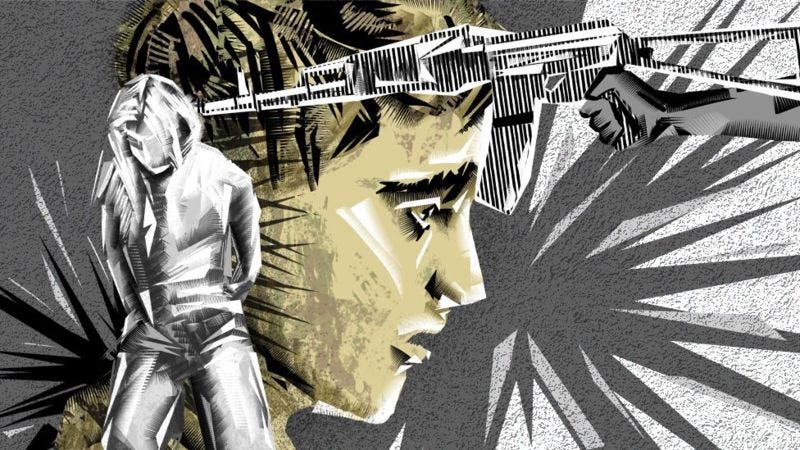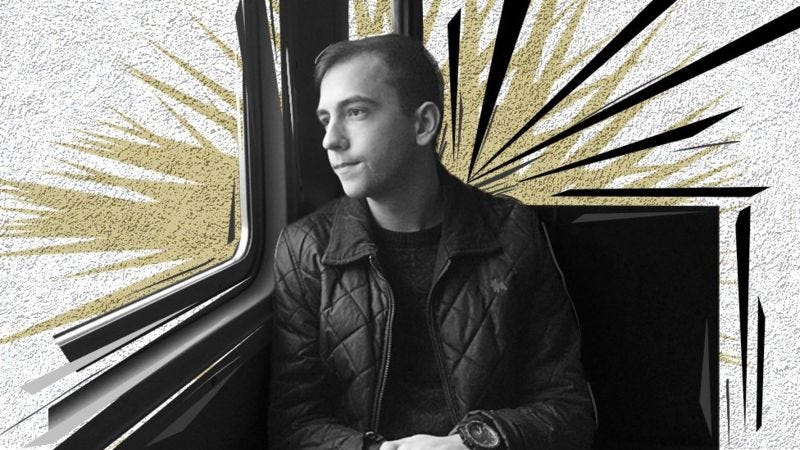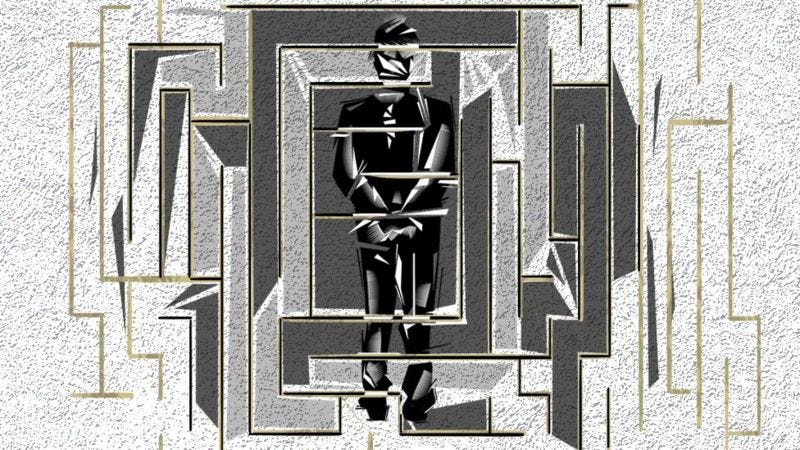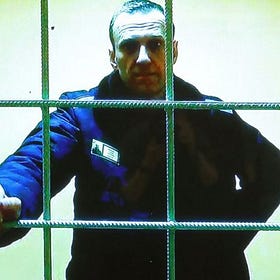LONG READ — “We have come to liberate you.” How Ukrainians from the occupied territories disappear in Russia’s prisons
Even when they can be located, there is no mechanism in international law governing the release of Ukrainian civilians from Russian captivity.
By Olga Prosvirova & Zhanna Bezpyatchuk.
Thousands of Ukrainian civilians are being held in penal colonies and investigative isolation units across Russia and the occupied territories. But where exactly is a mystery.
Singled out during the ‘filtration’ of captives, or simply picked up off the streets, they are accused of resisting Moscow’s ‘Special Military Operation’. In the absence of charges, investigation, trial or release date, however, there’s no way to track them down. And unlike prisoners of war, there isn’t a formal mechanism to secure their freedom.
"He admitted everything"
Volodymyr Buzynov falls silent for a moment if you ask him what things were like before the war:
"I've already forgotten,” he says. “Life has been split in two."
When full-scale hostilities began in Ukraine, Volodymyr, his 24-year-old brother Mykyta, their mother, and Mykyta's girlfriend Kateryna, all moved to the village of Mikhaylo-Kotsyubynske, 20 kilometres from the regional centre of Chernihiv Oblast. In the early days of the war, many Chernihiv residents hoped to sit out the shelling by moving there.
"But by the end of February, their convoys started passing through the village," recalls Volodymyr. "Our tanks initially stood at the crossroads - and fought back as best they could. But it was an uneven fight, and by early March the Russians had already entered the village centre."
Throughout their attempt to advance on Kyiv, enemy columns passed through Mikhaylo-Kotsyubynske.
"When their armoured columns get struck, they immediately search all the villages for anyone who could be passing on grid references," says Volodymyr. "On March 4, they started searching in our village, going from house to house, interrogating people. Then they came to us."
At that moment, shelling began.
"More than a dozen soldiers packed the basement alongside members of my family, seeking shelter from the shellfire," says Volodymyr. Nestled between sacks of potatoes, the Russians gave a lesson in political propaganda: “’We have come to liberate you, to free you from your government. Putin is cool.’"
When the shelling ceased, the officer who appeared to be in charge came down into the basement— he had no identifying insignia, but his manner of talking was why Buzynov's family assumed he was ‘senior’. He confiscated their phones, went out to take a look at them, and quickly returned. Volodymyr, Mykyta, and their mother were immediately led onto the street.
"They started shouting at us, saying we were passing on grid references. They showed us some screenshots with geolocation coordinates." Volodymyr and Mykyta insisted they hadn't shared any such information. No one believed them. To ‘break’ the men, the soldiers separated them.
"They took Mykyta behind some trees. Then we heard a fake execution, how they lined up everyone they caught against the wall, and yelled, 'Get ready! Aim!' They just didn't shout 'Fire!'.
“They brought Kateryna to Mykyta, made her kneel next to him, and aimed a rifle at her head. They said, 'If you don't confess, we'll shoot her right now.' Mykyta may have 'confessed' to something to save her, because they let her go. But as for him, they told us: 'He admitted everything. He’s facing up to 15 years.'"
All those detained by the Russian soldiers this way were put in a vehicle and driven off. For a while, the captives were held in the same village, in a basement room. But then they disappeared entirely.
"It's better if they think you're a criminal"
When one of the sides to the conflict calls it a ‘Special Military Operation (SVO)’, rather than a war, civilians become the group most at risk. ‘Resisting the SVO’ is precisely the grounds on which Russia justifies detaining civilians, making no distinction between them and prisoners of war. In response to enquiries about captured non-combatants, the Russian Ministry of Defence would stress that they were “being held in accordance with the requirements of the Geneva Convention on the treatment of prisoners of war”.
The Geneva Convention covering the protection of civilian populations during war says nothing about the possibility of taking civilians prisoner, but does prohibit the taking of hostages. Everything in the conventions about prisoner-taking relates exclusively to military personnel. As for civilians, they say non-combatants can only be detained 'in accordance with the laws and rules of the occupying side’, and with the guarantee of due judicial process.
"If we’re talking about detention then there ought to be an article in either the criminal code or administrative law which states that 'resisting the Special Military Operation' is an offence. That would give procedural status to these people. And as human rights defenders, we could appoint a lawyer,” says lawyer Polina Murygina, creator of the 'Every Human Being' project that works to locate civilians in Russian colonies.
“But to this they say to me ‘No, no: we haven’t charged them, and we don’t suspect them of anything. They’ve simply been detained for resisting the Special Military Operation.’”
Under Russian law, a person can only be detained for 48 hours without a court order, and strictly in accordance with an established procedure that includes protocols documented by authorised individuals. Last summer, the period was extended by Putin to 30 days in occupied areas of Ukraine, but only for detainees suspected of committing serious crimes or violating wartime prohibitions or restrictions.
The time, place and grounds of detention of Ukrainians by the Russian military are often not recorded, however. No criminal or administrative cases are opened, and no investigations are conducted, according to court papers reviewed by the BBC.
People just disappear.
Finding someone in the system, let alone extracting them from it, is very difficult.
"In assisting such captives, we have come across a legal paradox: it's better if they think you're a criminal," says Murygina. Once a person is charged, they begin to appear on the legal radar screen, and therefore they have rights. If they are prisoners of war, they can be exchanged. Civilian 'detainees', however, languish in Russian penal colonies and pre-trial detention centres often without defence, without charge, and without trial. They may physically exist somewhere inside the Russian penitentiary system, but formally, they are not there.
According to lawyer Maria Eismont, access to legal counsel is practically non-existent for those detained without charge. "Neither I nor others of my colleagues have managed to find such people and meet them. This is despite requests from their relatives to visit and information about their whereabouts - and despite the right of every detainee to an attorney.”
Even if the Ministry of Defence confirms that someone detained for ‘resisting the Special Military Operation’ is on ‘Russian territory’ they refuse to disclose the location until ‘investigative measures’ have been completed. But such measures have neither a time limit, nor can they be appealed against.
"We tried turning to both military and civilian courts," says lawyer Leonid Solovyov, who spent nearly two years unsuccessfully searching for a student from Kharkiv. "There are no longer any legal instruments here: it’s a totally political matter."
“You have to rely on the answer you get at the door”
The column of Russian soldiers left Mikhaylo-Kotsyubynske on March 31, 2022, as part of a general retreat from Kyiv and Chernihiv. Ukrainians began delivering food and water to the Chernihiv region and collecting the bodies of the dead. Mykyta Buzynov was not among them.
His family was convinced that the young man had survived, but had no idea what could have happened to him. Immediately after the liberation of the Chernihiv region, the Buzynovs began the search for Mykyta.
They followed the simplest and perhaps the only available path—sending letters through the prisons letter service, which allows one to send electronic messages to some penal colonies and investigative isolation units. It’s not only a way to communicate with detainees but also a means by which lawyers, human rights activists and families can locate people in the Russian penitentiary system: if the recipient is indeed in a penal colony, the sender receives confirmation of the letter's delivery.
Mykyta’s friends and relatives sent letters in every direction until they received a response from a pre-trial detention centre in Belgorod, ‘SIZO-3’, just over the border in Russia, confirming that he was being held there. A lawyer went to visit, but was told there was nobody of that name there.
On June 21, BBC Russian sent two letters to institutions in the Belgorod region—SIZO-3 and Penal Colony 4 in Alekseyevka.
On June 22, we received a response from SIZO-3: "The administration of SIZO-3 Belgorod informs: letter No. ... cleared censorship and was handed over to the addressee." That ought to have meant that the person the letter was addressed to was indeed located in the institution. But the next day, we received exactly the same response from Alekseyevka…
On July 10, the BBC tried again — we sent letters to the same institutions, along with several more colonies and SIZOs in other regions where, according to journalists and human rights activists, Ukrainian prisoners were being held.
Most institutions came back saying that they did not have any such prisoner. But three responded - including SIZO-3 and Alekseyevka in the Belgorod region, which again reported that the letters had been delivered.
"Pretty often, I arrive and they tell me the person isn’t there. Either they just won’t let me in, or the person has in fact been relocated,” says lawyer Leonid Solovyov. “You can't go there and expect to be able to check all the cells. You have to rely on the answer you get at the door or, in the best case, from the prison chief's office."
Among the lawyers interviewed by the BBC, not a single one reported a successful trip when they had been able to meet a Ukrainian detainee.
Peaceful "prisoners of war"
The ‘Every Human Being’ project spent a long time working on the case of 25-year-old Ivan Honchar, a resident of Mariupol, detained in April 2022 during ‘filtration’ at the Russian-Ukrainian border. Project founder Polina Murygina entered into direct correspondence with the Russian defence ministry as part of the effort to find him and get him a lawyer.
"I had a theory about where he was being held,” she says. “And we asked the Ministry of Defence about it directly. In response, we got a long tirade about how Honchar was being detained for resisting the ‘Special Military Operation.'"
The BBC has seen the official response, which states that the ministry cannot provide information about Honchar’s whereabouts to third parties, but stresses that he was being held "in accordance with the requirements of the Geneva Convention on the Treatment of Prisoners of War." What the Defence Ministry did not explain was how Honchar, who has never served in the army, had anything to do with being a ‘prisoner of war’ in the first place.
Just as soon as the Ukrainian army conducts counter-offensive operations, the Russian army and the security services start detaining civilians ‘for resisting the Special Military Operation’, according to Anastasia Panteleyeva, an analyst at the Media Initiative for Human Rights (MIHR). The organisation documents human rights violations and war crimes committed during the war.
"A person can be arrested just because the windows in their house overlook an area of potential importance to the Russian military. And if the soldiers get shot at, the person living nearby gets blamed for directing the fire," she says.
And so civilians continue to disappear in prisons on territory captured by the Russian army. There’s evidence that some prisoners are transferred either to annexed Crimea or to Russia itself. According to human rights activists, Crimean detention facilities are predominantly filled with Ukrainian nationals. The BBC spoke with one prisoner who said that Ukrainians are treated there “like sub-humans."
The stories of those who have been released
Ukrainian human rights defenders the BBC has spoken to acknowledge they are often able to obtain information about civilian hostages from exchanged Ukrainian prisoners of war, or indeed from other civilians.
In Ukrainian law, a civilian detained on occupied territory by Russian forces for supporting their country is considered, in essence, abducted and a hostage. In the course of prisoner exchanges, more than 140 civilians have returned home, according to Ukraine's human rights ombudsman, Dmytro Lubinets. But there are also those whom the Russians have released without explanation. The exact number is unknown.
Some recount stories about their cellmates, or recall names they heard during roll calls and searches, or when people were taken for interrogation, or transferred between facilities.
It was precisely thanks to the witness statement of a freed soldier that Yulia Khrypun found out about her father’s whereabouts (she asked not to name him). The soldier said he’d been held until August 2022 in a pre-trial detention centre in Crimea.
Before the Russian invasion, Yulia’s father worked as a guard at a grain warehouse near Tokmak in the Zaporizhzhia region. The warehouse was swiftly occupied by Russian forces. He stayed there for the first month of the war without leaving. And then he was arrested.
To begin with, he was held in the Yelenovskaya prison colony in the Donetsk region, before being transferred to Kursk. Just as in the case of Ivan Honchar, Russia claimed the man was a prisoner of war, even though he was in reality a civilian.
From Kursk, Yulia's father was moved to a detention facility in Crimea. There, a Ukrainian soldier who shared a cell with him witnessed him being led away somewhere. The hope was that he might be part of a prisoner exchange. But he never came home.
Four months later, his daughter received official confirmation from the Red Cross that her father had indeed, in August 2022, spent time in a Crimean prison. As for where he could be now, Yulia has no idea.
"They made me kneel and told me to pray”
"Sometimes, if relatives are in territories controlled by Ukraine, they turn to the police, other government agencies, or human rights activists, thinking their loved ones might have been taken to Russia,” says Anastasiya Panteleyeva of MIHR.
These people are included in the lists of civilian hostages, even if there are no witnesses to their abduction yet. State agencies act similarly. But sometimes, a person is listed, and then it turns out that they have died. A few weeks ago, in the Chernihiv region, they exhumed a man in the woods who they thought had been sent to Russia," shared Anastasiya Panteleyeva.
She notes that until October 2022, relatives in recently occupied territories wrote messages on local social networks about a person's disappearance and searched for witnesses of their abduction - but then they stopped. "This may be due to Russia gaining full control over these territories. People began to fear taking such actions," the expert says.
Another method to find a detained person in occupied areas was shared by 29-year-old Anton Lomakin, who went through captivity himself. His grandmother asked a woman with a Russian passport issued in Russia to visit the occupation administration and inquire about her grandson's whereabouts. This approach helped and information was provided, but when the grandmother herself approached the same administration, she received no response.
According to Yulia Khrypun, this method helps only a few. When occupation administrations or Russian authorities find out that such a person is not a direct relative, they usually refuse to provide information.
Anton Lomakin, a police officer in Kherson, wasn’t able to get away when the invasion happened. He stayed hidden, and in the summer of 2022 gathered information which he passed on to the Ukrainian military. Eventually he was captured - according to Lomakin, he had been betrayed by the colleague who used to bring him supplies.
"While they were transporting me, they used a taser on my legs and other parts of my body. They staged a mock execution during the journey, too. They led me out, and I saw some kind of dugout, pit, or trench - a hole in the ground in front of me. They made me kneel and told me to pray, and asked if I smoked cigarettes. They asked if I had anything else worthwhile to tell them. They reloaded the gun. Then they fired just past my left ear. There were three or four short bursts. A mobile phone rang, for one of those gathered there. He turned on the speaker. Someone at the other end said not to shoot me. They took me back again."
Lomakin was taken to a temporary detention facility on Kherson’s Teploenergetikov Street. He was interrogated four times. He recalls that during interrogation he was beaten, threatened, and doused with cold water, almost causing him to choke. His account matches the testimonies of other prisoners of this jail at the time the city was occupied.
"One time, they told me to lift my legs with my heels up. I refused. They put a gun to my genitals and gave me a choice. Of course, I chose to raise my feet,” he says. “They took two rubber truncheons and bludgeoned my heels with them for a long time. Any time I lowered my feet, I was made to lift them again. Otherwise they beat me about the head and on my back,” he recalls.
The BBC has written to the Russian Ministry of Defence for comment and is waiting for a response.
Lomakin shared a cell with seven other men: one was a former Ukrainian police officer, and another lived in the centre of Kherson, near the building where Russian military were stationed. Both were accused of being Ukrainian intelligence agents. The other cellmates couldn't explain why they had been imprisoned.
Before the liberation of Kherson, Anton Lomakin was transferred to the town of Hola Prystan, where the Russian occupation administration had re-opened a local pre-trial detention facility - it had been closed by Ukrainian authorities because it didn’t comply with European standards. From there, Lomakin went to yet another isolation unit in the region. After 104 days, he was released - penniless and without documents.
Tens, Hundreds, Thousands
According to the Ukrainian government, as of November 2023 there were 4,337 Ukrainians in Russian captivity. Among them, 3,574 individuals were military personnel, and 763 were civilians. The Ukrainian authorities rely on data from the Red Cross. But the Red Cross cannot always gain access to the places where Ukrainians are held in Russia, let alone to detention facilities and penal colonies in the occupied territories, where they are often held in police precincts or in basements. Dmytro Lubinets, the human rights ombudsman, puts the figure as high as 25,000 missing civilians.
"The main problem is that there are lost people who have never been reported. We need a complete list of everyone who was kidnapped and the witnesses who saw it happen. But such a list doesn't exist," says Anastasia Panteleyeva from MHIR.
Russian and Ukrainian human rights activists have identified more than 30 penal colonies and detention facilities in which there have been reports of civilian detainees who can’t be contacted.
The BBC has asked the Russian defence ministry to disclose information about the number of Ukrainian civilians detained in the occupied territories, and to provide a list of prisons and detention facilities where the individuals are being held. At the time of publication, there had been no response.
"Civilians are taken prisoner for lots of reasons. First, they want to isolate people who might help the armed forces of Ukraine, or those who might protest too loudly," says Panteleyeva.
"Secondly, we don't know Russia's plans for prisoner exchanges. If Ukraine agreed to exchange civilians for military personnel, it would set a dangerous precedent. Russia might start taking even more civilian hostages to get its soldiers out of captivity. Thirdly, civilian captives are a good way of putting pressure on the Ukrainian authorities: Russia tells the relatives nothing, so the only recourse is to pressurise their own government.”
"I don’t think all this was intentional,” argues lawyer Leonid Solovyov, when asked by the BBC why Russia keeps Ukrainian civilians in detention without charge. "They just gathered up anyone who seemed suspicious. But to release these civilians would mean admitting that they had been wrongly detained in the first place. In other words, acknowledging a mistake had been made. And that's not how things are done in Russia. As another plus, taking civilian hostages tops up the pool of people who can be used in prisoner exchanges."
What Ukraine is doing
Apart from their relatives, the Ukrainian national police and the Office of the Prosecutor General of Ukraine are also involved in searching for missing or abducted persons. If someone disappears in the occupied territories and there are witnesses to their detention by representatives of the Russian Federation, the national police qualify it as a war crime.
"If we don’t have enough information to indicate detention or confinement by the aggressor, it can be qualified as 'disappearance under special circumstances’. In these cases, law enforcement agencies seek to discover where the person might be now, where they’re detained, and whether they are being tortured," explains Irina Didenko, head of department at the prosecutor’s office.
As she says, it’s often relatives who provide valuable testimony in such cases: "What we have to do is record their statement and then trace where the person might be now, because they are often moved from one torture chamber to another. Yes, indeed torture chambers: 90% of those detained are subjected to torture."
In international law, there's no specific mechanism for freeing civilians from captivity. The Geneva Conventions state that a combatant can only be exchanged for a combatant. From a legal point of view, you can release a civilian, but not in exchange for someone who has borne arms.
"Potentially, the best way to release and repatriate civilian hostages might be through a third party state. One that isn’t actively involved in the war in Ukraine, but one that can start talks with Russia about the status of the detainees. Then, take steps towards their release," says Irina Didenko, from Ukraine’s prosecutor’s office.
Countries like Qatar, the United Arab Emirates, Saudi Arabia, and Turkey could play a role. They have already negotiated exchanges of prisoners of war, the return of deported children, and the release of foreigners from Russian captivity. The UAE was involved in the latest prisoner exchange which included civilians, as well as military personnel.
When it comes to the United Nations, even human rights activists hold out little hope. The mechanisms are outdated, they say - UN documents don’t cover this kind of ‘detainee’.
“There’s nowhere we haven’t turned to,” says Volodymyr, the brother of Mykyta Buzynov, detained in Chernihiv region, and missing to this day.
“To start with, we had the childish illusion that we’d get help from international organisations. We thought the Red Cross, the UN, or the OSCE… that they’d all get involved,” Vladmir says.
“But all we got from them was: ‘Registered. Received,’" he says. “We never got further than that.”
BBC is blocked in Russia. We’ve attached the story in Russian as a pdf file for readers there.
Read this story in Russian here.
English version edited by Chris Booth.
All graphics by BBC Russian Service.
LONG READ: How Russian diplomacy lost its influence on Putin and failed to stop the war
Over the past decade the Russian Foreign Ministry has been increasingly sidelined, powerless to influence policy, and reduced to echoing the aggressive rhetoric coming from the Kremlin.
“Victims of Disappearance”: Why it’s so easy for detainees to go missing in Russia’s prisons
The rules that allow a prisoner’s location to be kept secret during transit often can be used to put pressure on the detainee — almost always a political prisoner, as it suits the Russian authorities.












